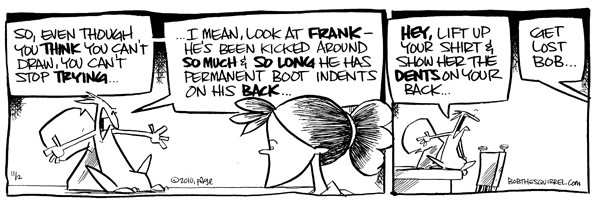[From the Archive] Playing Well With Others: Collaborations
In that vein… Frank Page of Bob The Squirrel has been SO RIGHT ON this week…

And geez, I’ve got to be more consistent with this… This week’s archive post…
Do you play well with others? Do you like symbiotic relationships which can lead to amazing new vistas of creative endeavors? Are you an inherent compromiser and peacemaker? Then collaborative efforts may be for you.
Collaborations are, undoubtedly, the most difficult (and sometimes) the most rewarding efforts in writing, but they’re definitely not for everyone. Collaborations are not for the faint of heart or the diva personality. A good collaboration is a relationship with a lot of communication and compromise, but resulting in an effort which is – ideally – stronger and better than the sum of its parts.
I had the pleasure to attend a panel at ConDFW on collaborations featuring David Weber and Steven Brust. One of my personal collaborators, Dusty Rainbolt, was on the panel along with P.N. Elrod and Teresa Patterson. P.N. Elrod was the moderator and kept the panel entertaining and informative. The basic premise came down to the Basic Reasons for Collaborating:
• A learning process – there’s a skill or process you can acquire by working with another writer. This is meant mostly by a observational and even osmosis process of working together. This could be anything from timing to plotting to humor to characterization.
• A mentoring process – some established writers will work with a “younger”, “newer” writer to help that younger writer reach their full potential. This is, sometimes, facilitated by publishers and editors rather than the writers themselves.
• A stronger/better project – in the end it all comes down to creating a better project. A collaborative effort may allow a writer to branch out into a different style or genre more easily by working with another writer.
Collaborations can be done for any reason, the main one being money. Most writers write with cash being an end goal. There are also different types of collaborations.
• Traditional – traditional collaborations are the ones we’re most familiar with, two or more authors on a cover of a book or story. In ideal situations the project is 50/50 effort on the parts of all authors.
• Shared Universe – collaborations where authors share a universe or are writing in or about someone else’s worlds. These can be “companion” books, anthologies, or even the “with” books (Big Name Author’s X World with Previously Unknown Writer).
• Ghostwriting – these are the “celebrity” books and/or a story the publisher wants out but knows the person can’t write it. They hire someone to write the story for them, and even though that writer is rarely acknowledged, it’s one of the toughest kinds of collaborations because the writer has to tell a story in another voice.
Any or all of these collaborations can be applied to non-fiction as well as fiction and can be allow writers to go until they reach a block and then pass it off to their partner, and then be reinspired by each volley of the project between partners – whether you’re writing chapter by chapter or scene/segment by scene. The symbiotic blending of styles and personalities are what can make or break an anthology.
Which is also what makes it a challenge to accomplish. Collaborations are blendings of two or more unique visions into one cohesive whole. And the more authors you put into the mix, the more challenge there is. The hardest project I’ve ever been involved with is a “Braided Novel” with four authors. Each author wrote his/her piece, and then it was blended into one whole novel. Then it took effort and compromise to smooth out the rough edges so it did, indeed, read as one entity. Don’t try this at home, unless you are an experienced writer, a masochist, or both.
Finally, logistics. Collaborations, like relationships, have a dynamic. There will, hopefully, be one person more geared toward the organizational details. This is the person who should be in charge of keeping the master file, doing the contractual work, and being the contact person. But it’s something that should be mutually agreed upon and doesn’t mean that person runs rough shod over the partner(s). Knowing that up front can save a lot of time, argument, headaches, and messy split ups.
Collaborations are only for the adventurous. Do not go into them lightly, but when you have the opportunity, grab it. The learning experience alone will be worth it in the end. You never know who you may end up working with or what can happen. Two heads (and sometimes three or four) can be better than one. And as a writer, we’re always looking to improve – which is why I’m “up for adoption” when it comes to collaborations. Growth is good.